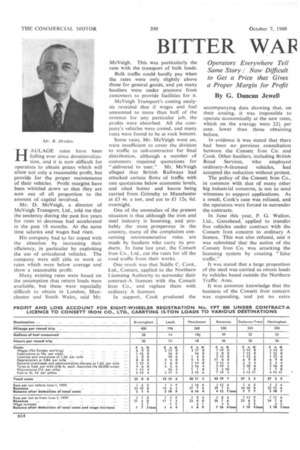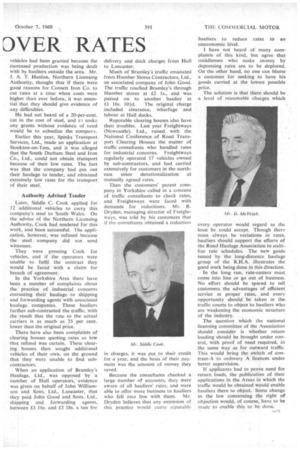BITTER WAT DYER RATES
Page 62

Page 63

If you've noticed an error in this article please click here to report it so we can fix it.
Operators Everywhere Tell Same Story : Now Difficult to Get a Price that Gives a Proper Margin for Profit By G. Duncan Jewell
HAULAGE rates have been falling ever since denationalization, and it is now difficult for operators to obtain prices which will allow not only a reasonable profit, but provide for the proper maintenance of theirvehicles. •Profit margins have been whittled down so that they are now out of all proportion to the amount of capital involved.
Mr. D. McVeigh, a director of McVeigh Transport, Ltd., told me that the tendency during the past five years for rates to decrease had accelerated in the past 18 months. At the same time salaries and wages had risen.
His company had so far coped with the situation by increasing their efficiency, in particular by exploiting the use of articulated vehicles. The company were still able to work at rates which were below average and show a reasonable profit.
Many existing rates were based on the assumption that return loads were available, but these were especially difficult to obtain in London, Manchester and South Wales, said Mr. McVeigh. This was particularly the case with the transport of bulk loads.
Bulk traffic could hardly pay when the rates were only slightly above those for general goods, and yet many hauliers were under pressure from customers to provide facilities for it.
McVeigh Transport's costing analysis revealed that if wages and fuel amounted to more than half of the revenue for any particular job. the profits were absorbed. All the company's vehicles were costed, and many rates were found to be at rock bottom.
Some rates, Mr. McVeigh went on, were insufficient to cover the division to traffic to sub-contractor for final distribution, although a number of customers required quotations for "delivered to user." Mr. McVeigh alleged that British Railways had attacked certain flows of traffic with rate quotations below economic levels, and cited butter and bacon being carried from Grimsby to Manchester at £3 4s. a ton, and cut to £1 12s. 6d, overnight.
One of the anomalies of the present situation is that although the iron and steel industry is booming, and probably the most prosperous in the country, many of the complaints concerning unremunerative rates are made by hauliers who carry its products. In June last year, the Consett Iron Co., Ltd., cut the rates for all the road traffic from their works.
One result was that Siddie C. Cook, Ltd., Consett, applied to the Northern Licensing Authority to surrender their contract-A licences with the Consett Iron Co., and replace them with ordinary A licences.
In support, Cook produced the accompanying data showing that, on their costing, it was impossible to operate economically at the new rates, which on the average were 221 per cent. lower than those obtaining before.
In evidence it was stated that there had been no previous. consultation between the Consett Iron Cc'. and Cook. Other hauliers, including British Road Services, who employed ordinary-A-licensed vehicles, had accepted the reduction without protest.
The policy of the Consett Iron Co., in common with that of many other big industrial concerns, is not to send witnesses to support applications. As a result,. Cook's case was refused, and the operators were forced to surrender the contracts.
In June this year, P. G. Walton, Ltd., Gateshead, applied to transfer five vehicles under contract with the Consett Iron concern to ordinary A licence. This was also refused, and it was submitted that the action of the Consett Iron Co. was attacking the licensing system by creating "false traffic."
It was stated that a large proportion of the steel was carried as return loads by vehicles based outside the Northern Traffic Area.
It was common knowledge that the business of the Consett Iron concern was expanding, and yet no extra
vehicles had been granted because the increased production was being dealt with by hauliers outside the area. Mr. J. A. T. Hanlon, Northern Licensing Authority, thought that if there were good reasons for Consett Iron Co. to cut rates at a time when costs were higher than ever before, it was essential that they should give evidence of any difficulties.
He had not heard of a. 20-per-cent. cut in the cost of steel, and ta make any grants without evidence of need would be to subsidize the company.
Earlier this year, Spin.ks Transport Services, Ltd., made an application at Stockton-on-Tees, and it was alleged that the South Durham Steel and Iron Co., Ltd., could not obtain transport because of their low rates. The fact was that the company had put out their haulage to tender, and obtained extremely low rates for the transport of their steel.
Authority Advised Tender Later, Siddle C. Cook applied for 12 additional vehicles to carry this company's steel to South Wales. On the advice of the Northern Licensing Authority, Cook had tendered for this work, and been successful. The application, however, was refused because the steel company did not send witnesses.
They were pressing Cook for vehicles, and if the operators were unable to fulfil the contract they would be faced with a claim for• breach of agreement.
In the Yorkshire Area there have been a number of complaints about the practice of industrial concerns entrusting their haulage to shipping and forwarding agents with associated haulage companies. These hauliers further sub-contracted the traffic, with the result that the rate to the actual carriers is as much as 25 . per cent. lower than the original price.
There have also been complaints of clearing houses quoting rates so low that refusal was certain. These clearing houses then sought additional vehicles of their own, on the ground that they were unable to find subcontractors.
When an application of Bramley's Haulage, Ltd., was opposed by a number of Hull operators, evidence was given on behalf of John Williamson and Sons, Ltd., Lancaster, that they paid John Good and Sons. Ltd., shipping and forwarding agents, between £3 16s. and E3 18s. a ton for delivery and dock charges from Hull to Lancaster.
Much of Bromley's traffic emanated from Humber Stores Contractors, Ltd., an associated company of John Good. The traffic reached Bramley's through Humber stores at £2 Is., and was passed on to another haulier at 16s. 101d. The original charge included clearance, wharfage and labour at Hull docks.
Reputable clearing houses also have their troubles. Last year Freightways (Newcastle), Ltd., raised. with the National Conference of Road Transport Clearing Houses the matter of traffic consultants who handled rates for industrial concerns. Freightways regularly operated 17 vehicles owned by sub-contractors, and had carried extensively for customers in the northeast since denationalization at mutually agreed rates.
Then the customers' parent company in Yorkshire called in a concern of traffic consultants to check rates, and Freightways were faced with demands for reductions. Mr. R. Dryden, managing director of Freightways, was told by his customers that if the consultants obtained a reduction in charges, it was put to their credit for a year, and the basis of their payment was the amount of money they saved.
Because the consultants checked a large number of accounts, they were aware of all hauliers' rates, and were able to offer more business to hauliers who fell into line with them. Mr. Dryden believes that any extension of this practice would cause reputable hauliers to reduce rates to an uneconomic level.
I have not heard of many complaints of this kind, but agree that middlemen who make money by depressing rates are to be deplored. On the other hand, no one can blame a customer for seeking to have his goods carried at the lowest possible price.
The solution is that there should be a level of reasonable charges which every operator would regard as the least he could accept. Though there must always be variations in rates, hauliers should support the efforts of the Road Haulage Association to stabilize rate schedules. The new guide issued by the long-distance haulage group of the R.H.A. illustrates the good work being done in this direction.
In the long run, rate-cutters must come into line or go out of business. No effort should be spared to tell customers the advantages of efficient service at proper rates, and every opportunity should be taken in the traffic courts to object to hauliers who are weakening the economic structure of the industry.
The question which the national licensing committee of the Association should consider is whether return loading should be brought under control, with proof of need required, in the same way as for outward traffic. This Would bring the switch of contract-A to ordinary A licences under better supervision.
If applicants had to prove need for return loads, the publication of their applications in the Areas in which the traffic would be obtained would enable hauliers there to object. Some change in the law concerning the right of objection would, of course, have to be made to enable this to be done.
































































































































